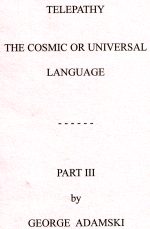
1958
Contents:
PART III
Chapter 1 Control of the Ego 5
Chapter II Relaxation. Interest and Reception 9
Chapter III Clairvoyance. Clairaudience, Premonitions, Etc. 18
Chapter IV Thinking Versus Reasoning 28
Conciusion 31
Relaxation. lnterest and Reception
Interest, unlike concentration, does not deplete the cells. Due to their state of curiosity regarding the new
information, the cells are open to the incoming force. Being in a free state, instead of using their stored-up
energy as they do with intense concentration, the cells are so normally balanced in action that they receive
equally as they give out, so no fatigue is felt.
But even with interest we must analyze our mental reactions, for there is personal interest and universal interest.
One may find that he is able to receive many impressions or premonitions regarding his own affairs, yet be a
closed channel for national, world, or universal impressions. If this person will watch his thought action closely,
he will discover that hundreds of thoughts pass through his brain during each day which do not register strongly
because they do not seem to pertain to himself, his personal experiences, or have appeal to his individualized
knowledge of outside affairs.
If he gives these thoughts any recognition, he generally releases them immediately as mere figments of his
imagination. But, after all, what is imagination? Is it not the faculty to objectify, or imagine that which is invisible
to the senses? As one Eastern philosopher aptly phrased it, "Imagination is the bridge between the known
and the unknown."
The wise man will leam to pay attention to all thought passing through his brain. He will heed not only those
pertaining to self, but also those thoughts taking place outside his personal field of comprehension, for only
in this way will he grow in knowledge and receptivity. It is indifference and lack of interest which causes
man to lose the greatest jewels of wisdom. . . lose them through apathy when he actually holds them within
his grasp.
page 10
It is not easy to hold one’s self always in a state of receptivity, because it demands a perfectly balanced
consciousness. It is not a simple task to keep the body in a state of relaxation and still maintain a positive
interest in all action around, and within us. Yet, this state is necessary to a good recipient. We must learn to
look upon our mental reactions as though we were an impersonal bystander, and our thoughts were nothing
more than actions taking place upon a stage.
To some people, this may seem a very haphazard way of experiencing life. For has not the human ego,
through hundreds of thousands of years, been trained to the idea of accomplishment by aggression and
personal effort? Yet, there are the fortunate few who have discovered the universal way of life. Such
persons inciude not only the seers and the philosophers (who, we pointed out earlier, understood that
mastery of the body was essential), but those in all walks of life. Thomas Edison, one of the great scientists
of our times, once remarked, "I have found that the answer to some of my most perplexing problems come
to me after I have ceased trying to solve them." In other words, the thoughts started to flow freely when his
interest was impersonal, and his intense concentration had been released.
page 11
Relaxation is generally misunderstood. In consequence, there are few people who have ever
experienced true relaxation. Contrary to popular belief, it is not a state of inertia. It is a condition of intensified
activity ... because it is free activity.
page 12
I give the booklet







of ten candles, because of the lack of a biography of George Adamski and the lack of photos of UFO's
and the Extraterristials, but it is worth reading, because you will gain much knowledge!
back to linkpage
suggestion
read and sign my guestbook








